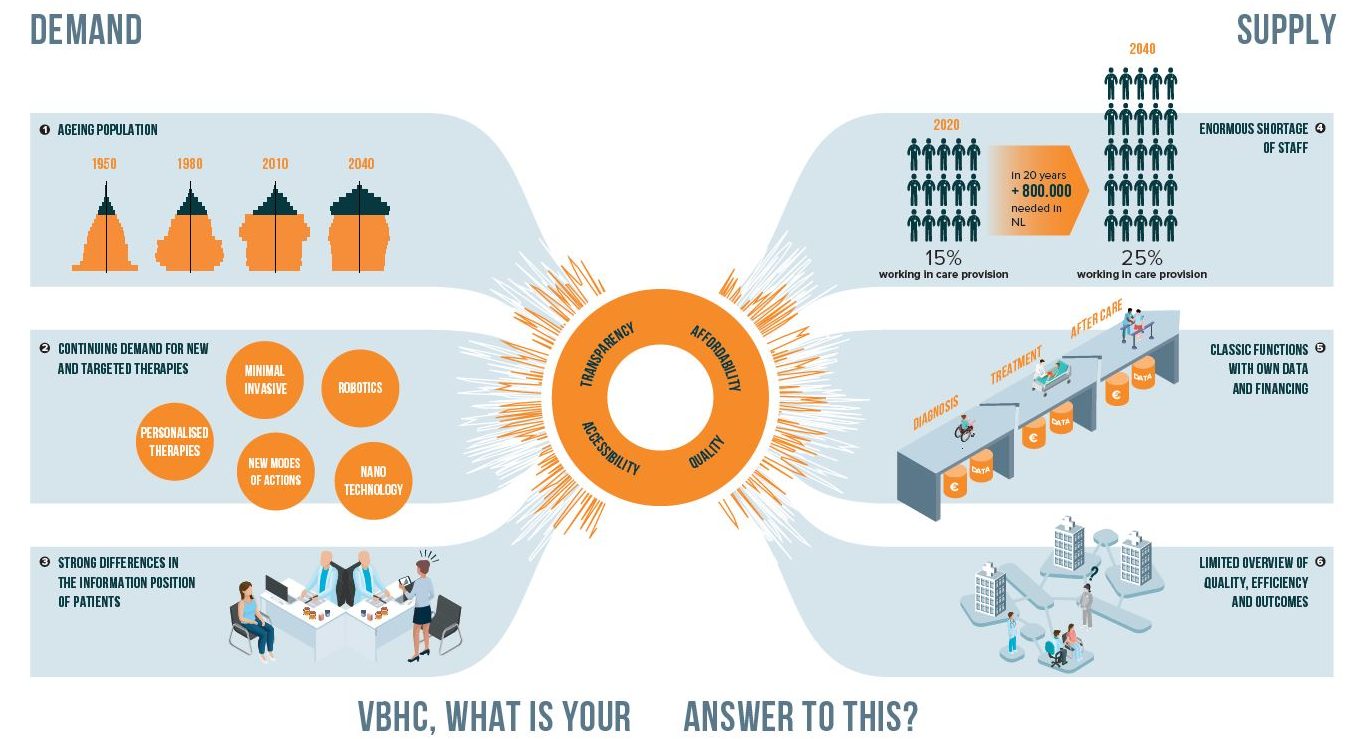Since prof. Michael Porter introduced the concept of Value-based Healthcare in 2006, the promise has been high. Organize healthcare for patient groups most effectively by integrating care across chain and use relevant patient outcomes to measure, reimburse and improve healthcare within and between providers.
Fifteen years later VBHC is still there and beyond the hype it has been. Quite some steps have been made towards a healthcare system organized and steered based on patient value instead of production volumes.
The question we should ask ourselves is whether VBHC is the answer to our future healthcare challenges. And if it is not, what do we need in its stead?

Improved patient value against lower total healthcare costs
A lot of initiatives have started since, with a growing group of providers, industry, government, payers and patient organizations committing themselves to a journey on organizing healthcare based on patient value. This has resulted in some impressive success stories as for example listed by EIT Health or in Vintura’s latest report in chapter 2 were we show the case of Punt voor Parkinson. Showing improved patient value against lower total healthcare costs. Despite these results over the past decade, Value-based healthcare is not the predominant mechanism we use to organize care. Far from it. Most initiatives struggle to get beyond the pilot phase, as upscaling and copying a successful approach proves to be a challenge, to say the least. We see several reasons for this.
First part of the reason lies in the fact that the transformation towards VBHC is not easy. Change management is an essential – and often overlooked – aspect of the VBHC journey, as we pointed out in Vintura’s report “VBHC, working together for real change” (Download our the first report) A concrete sense of urgency, common goals and ambitions, a step-by-step approach and having time, mindspace and persistency to make it work are several of the success factors to make it happen (read more about VBHC implementation).
Especially as quite some critical enablers are still not fully in place (financing and reimbursement mechanisms, data structures and connectivity), change management is even more important to co-create the right ecosystem that will drive instead of hamper VBHC roll-out.
Second, and major part of the reason why we haven’t adopted VBHC throughout our healthcare system, is because there is no one-story-fits-all; it is just not a solution for everything. The VBHC concept introduced by Porter is appealing as it focusses on a selected patient group, but has the risk of optimizing healthcare in splendid isolation. For some patient groups, like total hip replacements, this works very well. But as patient groups and/or treatment pathways become more heterogenous, the application of the VBHC concept becomes more strenuous. For these patient groups a different perspective is needed, one that enables coordinating of care for patients in complex networks. For this purpose we put forward the concept of Value-Managed Healthcare (VMHC).
VBHC doesn’t cover the total challenge we face
Finally we have to conclude that VBHC doesn’t cover the total challenge we face. The VBHC principle focusses on improving the way we deliver healthcare, as it considers patient outcomes delivered versus costs incurred. VBHC, however, gives little indication on how to deal with an increasing demand for care.
VBHC is a strong concept that we definitely need to transform the way we organize care. And VBHC can provide some answers on the healthcare challenges we will face in the upcoming decades, but we need to elaborate our VBHC-thinking to really overcome them. In our latest report you can learn more about the applicability of VBHC in different situations and how Value-managed Healthcare (VMHC) – in addition to VBHC – can help in dealing with tomorrow’s healthcare challenges .
Download our latest VBHC report
In the last months we have been working intensively on the latest key insights on VBHC. We created a comprehensive report that provides an integral view on the applicability of VBHC in general, with specific deep dives into elderly care and pharma. Theory, concepts and general observations are accompanied by a selection of latest real life case studies to make a direct link to practice.
Let’s discuss
Inspired to share your thoughts? Or would you like to learn more about our vision on Value-Based Healthcare and the value it has to tackle current and future healthcare challenges? We would be delighted to hear from you. Please feel invited to contact Koen Jansen and Gerard Klop.




